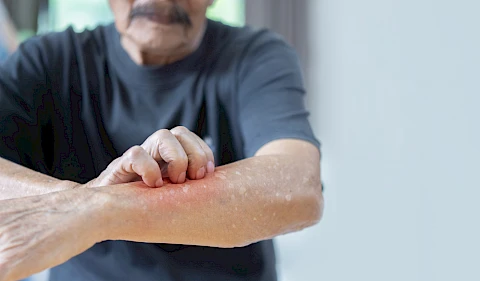
Allergies are not limited to the young. In fact, seniors may be more susceptible to allergies due to changes in their immune system as they age. This Senior Helpers blog post offers a guide to help caregivers spot the signs of allergies in their senior loved ones. We focus on identifying common allergens and combating their effects. Recognizing senior allergens and knowing the potential source of their discomfort can be a game-changer.
Allergies in Seniors
Our immune system naturally weakens as we age. It makes us more susceptible to adverse reactions from everyday allergens. For seniors, these reactions can manifest as minor allergies or exacerbate existing conditions. This heightened sensitivity makes it all the more critical for caregivers to understand allergens and their impact on seniors.
Common Allergens for Seniors
Many substances can trigger allergic reactions in seniors. These include dust mites, pet dander, mold, and certain types of food like nuts or dairy products. Some medicines can also negatively affect seniors. Consequently, if your senior loved one displays symptoms like coughing, sneezing, or itching, it could be due to an allergic reaction.
Seasonal Allergies and Seniors
Seasonal allergies, often associated with changes in weather, are common among seniors. These allergies can emerge during specific times of the year when certain allergens, like pollen, are more prevalent. Unfortunately, they can significantly impact seniors' quality of life, manifesting in persistent cold-like symptoms. It is essential to monitor any changes in seniors' health as seasons change so you can proactively manage these allergies.
Identifying Allergens
Identifying allergens is the first step toward managing allergic reactions. Here are a few things you can do:
Monitor the Environment
Take note of the environment. Anything new or different in the senior's environment could trigger potential allergies. This could include new cleaning products, different foods, or weather changes. Sometimes the ingredients in lotions or other skin treatments can also cause a reaction.
Observe Physical Symptoms
Symptoms like red eyes, sneezing, or difficulty breathing after being exposed to a particular substance can indicate an allergy. Keep an eye out for rashes and itching as senior skin is drier and thinner making it more susceptible to skin allergies.
Consult a Healthcare Professional
If you are unsure, consult a healthcare professional who can perform tests to determine the specific allergens causing the reactions. Allergy specialists typically use a scratch test or blood test to diagnose sensitivities to certain allergens.
Allergy Management for Seniors
Effective allergy management for seniors involves taking proactive steps to reduce exposure to allergens and treat symptoms when they occur. Here are a few tips:
Reduce Exposure
Regular cleaning can decrease the presence of household allergens like dust mites and pet dander. For seasonal allergies, keeping windows closed and using air purifiers can reduce exposure to pollen.
Treat Symptoms
Over-the-counter antihistamines can relieve mild allergic symptoms. However, it is important to consult with health professionals before introducing any new medication.
Get Professional Help
For severe allergies or if symptoms persist, consult with your senior loved one's healthcare team for comprehensive allergy management solutions. They can promptly diagnose and prescribe the safest and most effective treatments.
Don't Let Allergies Get You Down: Senior Helpers of Bolingbrook Can Help
Senior Helpers provides a wide range of quality, in-home senior care services. If you live in the Bolingbrook, Crest Hill, Joliet, or Romeoville areas, contact us today at Senior Helpers of Bolingbrook. We are here to offer professional and compassionate senior care, including help with managing senior allergies.